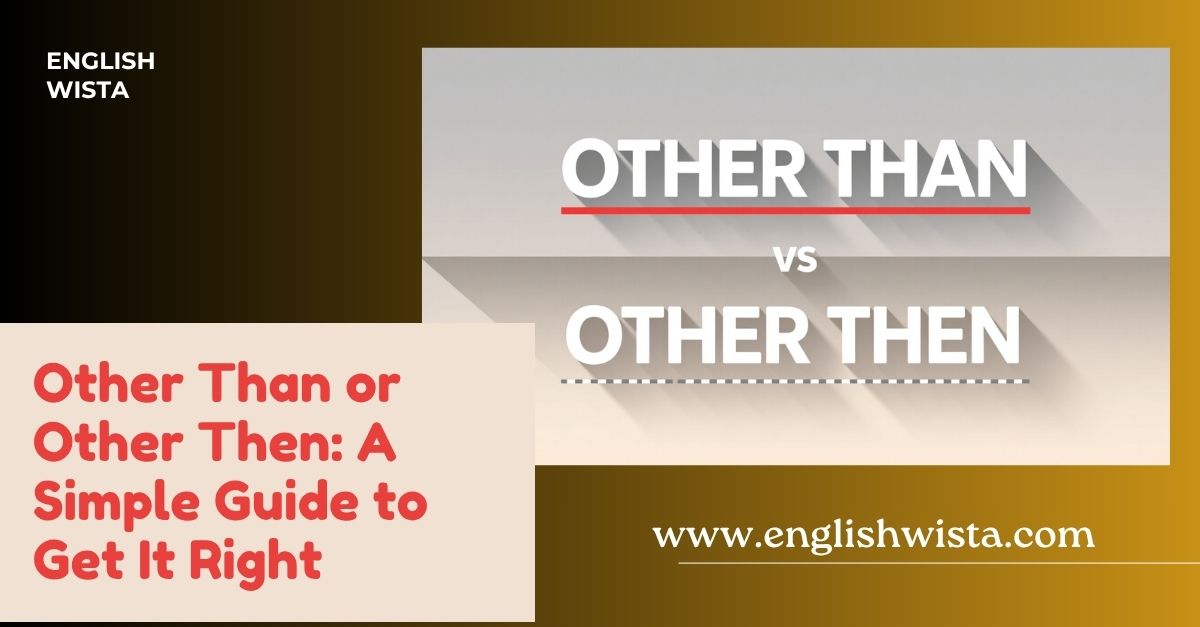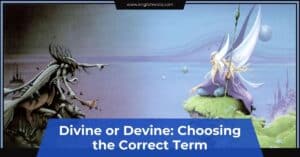Have you ever paused mid-sentence, unsure whether to write “other than” or “other then”? Don’t worry you’re not alone. This mix-up happens to native speakers and English learners alike. At first glance, both phrases look similar, but only one of them is usually correct in standard English. The other pops up mostly because people confuse the words “than” and “then.”
In this article, we’ll break everything down step by step. You’ll learn the difference between these two expressions, see plenty of examples, and discover some tricks to remember the right usage. By the end, you’ll feel confident choosing between “other than” and “other then” in your everyday writing and conversations.
The Core Question: Which One Is Correct?
The short answer:
- “Other than” is the correct and common phrase.
- “Other then” is usually a mistake, unless you’re combining “other” and “then” in a special way (which is very rare).
So most of the time, when you see or write “other then,” you probably mean “other than.”
What Does “Other Than” Mean?
Let’s define it simply:
Other than = except for / apart from.
It shows contrast or exclusion. When you use it, you’re pointing out something different from the rest.
For example:
- I don’t eat meat other than chicken.
(= I eat chicken, but not other kinds of meat.) - She had no friends other than her cousin.
(= Her cousin was her only friend.) - There’s nothing to do today other than watch TV.
(= Watching TV is the only option.)
In all these sentences, “other than” is working like “except for.”
Why Do People Confuse It with “Other Then”?
The confusion happens because “than” and “then” sound similar but mean very different things.
- Than is used for comparisons. Example: taller than, better than, more interesting than.
- Then usually relates to time or sequence. Example: first we ate, then we left.
When people type quickly, they sometimes grab the wrong one. Since “than” and “then” are just one letter apart, it’s an easy slip.
Can “Other Then” Ever Be Correct?
Technically, yes but it’s very rare. “Other” and “then” might appear together in a sentence if they’re not part of the same phrase.
For example:
- We’ll go to the park now, and if it rains, we’ll do some other activity. Then, we’ll head home.
Here, “other” and “then” are next to each other by coincidence. They don’t form a fixed expression like “other than.”
So unless your sentence is structured like this, you probably shouldn’t write “other then.”
Breaking It Down with Examples
Let’s compare the two side by side:
Correct (Other Than):
- I don’t want anything other than water.
- He has no hobbies other than reading.
- The store sells nothing other than clothes.
Incorrect (Other Then):
- I don’t want anything other then water. ❌
- He has no hobbies other then reading. ❌
- The store sells nothing other then clothes. ❌
As you can see, switching “than” to “then” makes the sentence look wrong and confusing.
A Trick to Remember the Difference
Here’s a simple memory hack:
- If you mean except for, use “other than.”
- If you’re talking about time or order, use “then.”
Think of it this way: “than” usually works with comparisons and exceptions. “Then” usually works with clocks and sequences.
Example check:
- “Other than pizza, I don’t like fast food.” → Sounds right because it’s about exclusion.
- “We ate pizza, then went to the park.” → Sounds right because it’s about time.
Is “Other Than” Singular or Plural?
Good question! It can work with both singular and plural nouns. What matters is the word that follows it.
- Singular: She had no choice other than to leave.
- Plural: There are no options other than these.
So you don’t have to worry “other than” adjusts itself depending on what comes after.
Common Mistakes People Make
Let’s look at some everyday errors and how to fix them:
- Mistake: I like no fruits other then mango.
Corrected: I like no fruits other than mango. - Mistake: There’s nothing other then waiting now.
Corrected: There’s nothing other than waiting now. - Mistake: He doesn’t play any sports other then cricket.
Corrected: He doesn’t play any sports other than cricket.
Notice how the wrong word instantly makes the sentence awkward.
Fun Fact: Where Does “Other Than” Come From?
The phrase “other than” has been around for centuries. “Other” comes from Old English oþer, meaning “different” or “second.” The word “than” comes from Old English þonne, used in comparisons. Over time, the two words joined together in certain contexts to mean “except for.”
So when you say “other than,” you’re really using a very old combination of words that English speakers have trusted for hundreds of years.
Practical Real-Life Examples
Here are some more natural sentences to show you how it works in daily life:
- I don’t know anyone here other than my neighbor.
- Nothing matters right now other than finishing this project.
- We have no choice other than to try again.
- The movie had no good moments other than the ending.
- I can’t think of any reason to leave other than being tired.
In each case, “other than” highlights the exception clearly.
Quick Quiz for Practice
Let’s test your understanding. Fill in the blanks with either than or then.
- She has no friends other ___ her dog.
- We went shopping, and ___ we had dinner.
- I don’t want anything other ___ coffee.
- First, clean your room, and ___ you can watch TV.
- He has no plan other ___ moving abroad.
Answers:
- than
- then
- than
- then
- than
Did you get them right? If yes, you’re on the right track!
When in Doubt, Simplify
If you’re ever unsure which word to use, try replacing “other than” with “except for.” If it works, you need “than.” If it doesn’t, maybe you’re looking for “then” instead.
Example:
- “I like no drinks other than tea.” → “I like no drinks except for tea.” ✔
- “We went shopping, and then had dinner.” → “We went shopping, and except for had dinner.” ❌ (Doesn’t work, so use then.)
Conclusion
Let’s wrap it up. The phrase you almost always want is “other than.” It means except for and helps you point out exceptions or differences. The phrase “other then” is usually just a mistake, unless the two words happen to sit together by chance in a sentence.
Here’s the easy takeaway:
- Use “other than” = except for.
- Use “then” = for time or order.
So next time you’re writing an email, a school essay, or even a quick text, you’ll know exactly which one to pick. And trust me once you practice with a few examples, it’ll become second nature.
Now that you’ve mastered the difference, you’ll never have to stop mid-sentence and wonder, “Wait… is it other than or other then?” again!



